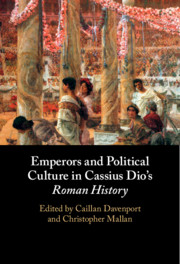Book contents
- Emperors and Political Culture in Cassius Dio’s Roman History
- Emperors and Political Culture in Cassius Dio’s Roman History
- Copyright page
- Contents
- Figures
- Contributors
- Preface
- Abbreviations
- Introduction Cassius Dio
- I Imperial and Political Narratives
- II Emperors and Biographies
- Chapter 5 Cassius Dio’s Funeral Speech for Augustus
- Chapter 6 ‘ … But He Possessed a Most Singular Nature’
- Chapter 7 An Emperor’s War on Greece
- Chapter 8 War and Peace
- III Political Groups and Political Culture
- IV Reception and Reflection
- Bibliography
- Index
Chapter 7 - An Emperor’s War on Greece
Cassius Dio’s Nero
from II - Emperors and Biographies
Published online by Cambridge University Press: 23 July 2021
- Emperors and Political Culture in Cassius Dio’s Roman History
- Emperors and Political Culture in Cassius Dio’s Roman History
- Copyright page
- Contents
- Figures
- Contributors
- Preface
- Abbreviations
- Introduction Cassius Dio
- I Imperial and Political Narratives
- II Emperors and Biographies
- Chapter 5 Cassius Dio’s Funeral Speech for Augustus
- Chapter 6 ‘ … But He Possessed a Most Singular Nature’
- Chapter 7 An Emperor’s War on Greece
- Chapter 8 War and Peace
- III Political Groups and Political Culture
- IV Reception and Reflection
- Bibliography
- Index
Summary
When reading Cassius Dio’s account of Nero’s reign, it is easy to become overwhelmed by the sheer, unrelenting criminality of the emperor. In fact, Dio’s Nero is not as much a man as a representation of a rhetorical tyrant. While he is not unique in portraying Nero as a disastrous ruler, Dio is extraordinary in his denial of the emperor’s philhellenism. In doing this, Dio not only contradicts Tacitus and Suetonius, but also discounts the praise of Nero given by other Greek writers, such as Philostratus, Dio Chrysostom, and Pausanias, when they highlight the emperor’s liberation of Greece as a redeeming feature of his principate. With this in mind, this chapter explores the distinctive features of Dio’s narrative when compared to other accounts of the emperor’s reign, and considers the motives behind and the effects of Dio’s portrayal of Nero as a hater, and not a lover, of Greece.
- Type
- Chapter
- Information
- Emperors and Political Culture in Cassius Dio's Roman History , pp. 158 - 176Publisher: Cambridge University PressPrint publication year: 2021

